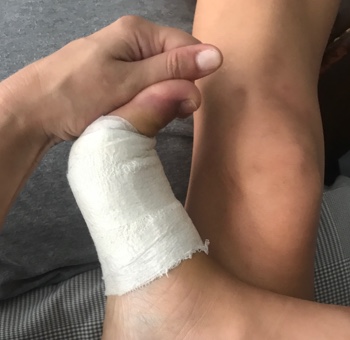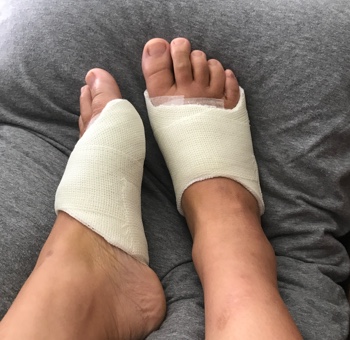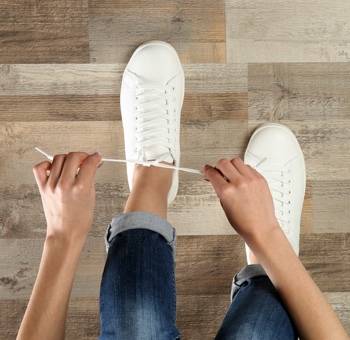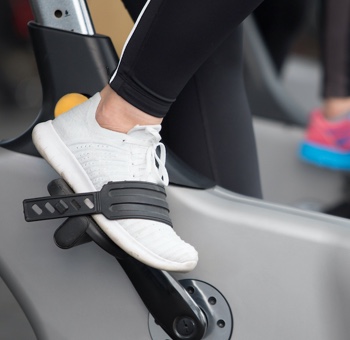
The Recovery Experience
The recovery experience for Syndesmosis Surgery is a unique journey back to normal foot functionality. Our patients typically report very ‘linear’ improvement over 6 months, meaning the foot gets better steadily and predictably, with few exceptions. To realize the best possible outcome, patient participation and cooperation is critical.
DAY 1-10
Hospital and Home
You may experience moderate pain for the first 1-2 days, but little afterwards. Painkillers should not be necessary after 2-3 days. Walking is allowed any time, but only indoors and with your surgical shoes. Elevation will keep swelling down and ice is for pain relief. Big toe mobility exercises: hold your big toe back for 30 seconds; push and release your big toe 30 times; and press your big toe against your hand for 30 seconds – repeat 3 times hourly until your big toe achieves a 90° extension.
DAY 1-10

MONTH 1
Sutures Holding Strong
Your surgical wounds are healing, and specially designed protective shoes will be worn after the procedure. They serve to protect the internal holding sutures while the new ligament is forming. Walk lightly, no more than 3,000 steps a day. Always use crutches for outdoor walking. Rest and elevate your feet whenever possible. Continue your big toe mobility exercises to maintain flexibility.
MONTH 1

MONTH 2-3
Syndesmosis Growth
You will find it much easier to walk, and you can take up to 5,000 steps per day. Your new ligament formation is well underway, but the entire process requires another two or more months. The internal absorbable holding sutures are starting to be absorbed by your body and becoming weaker by the day. Your protective shoes are therefore even more important than before. The Michael Jackson anti-gravity leaning and one-leg stand exercises are still important and recommended.
MONTH 2-3

MONTH 4
Transition Month
Without your protective shoes, you may gradually return to normal walking at a strolling pace. You will be given specific shoe inserts with your trainers. Continue your big toe strengthening exercises, adding balancing and walking exercises.
MONTH 4

MONTH 5-6
The Final Stretch
The bones in your feet and your new ligament(s) are strong enough to support normal walking. Since there is no method to test their actual strengths, we recommend low-impact exercises such as swimming and stationary bicycle. Continue all our exercises for strength, balance and a normal gait.
MONTH 5-6

AFTER 6 MONTHS
Graduation!
Your new ligament should have reached its peak strength. As you become more accustomed to your restored feet, it’s now relatively safe for you to gradually venture back to higher-impact exercise and higher heel heights as tolerated. We hope each and every patient will be motivated by their renewed feet and make use of them for a healthier and more active lifestyle.
AFTER 6 MONTHS
